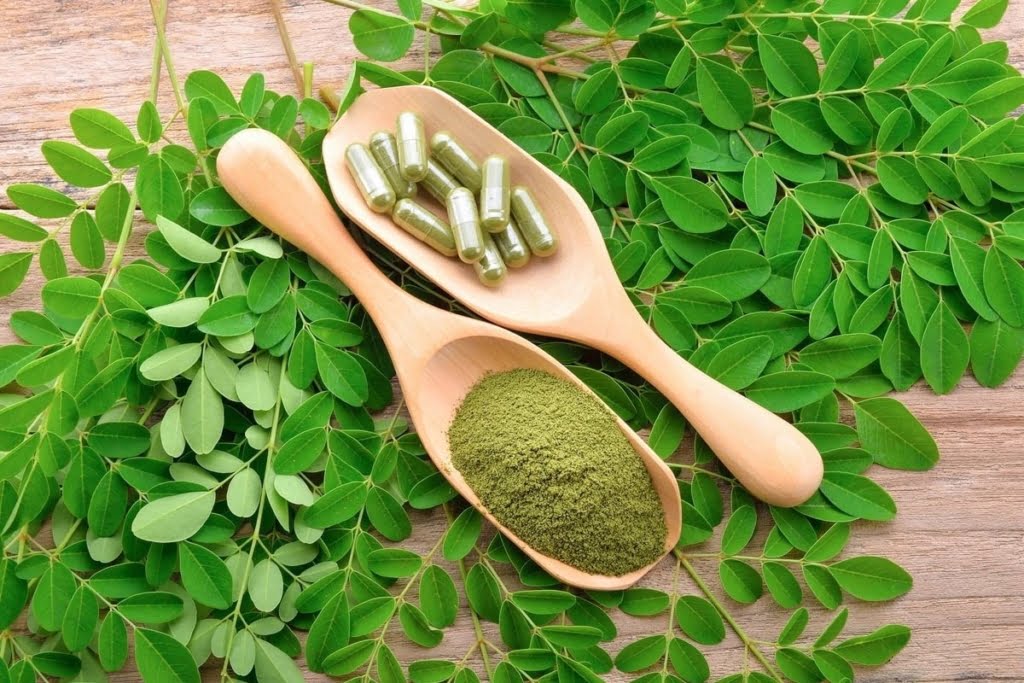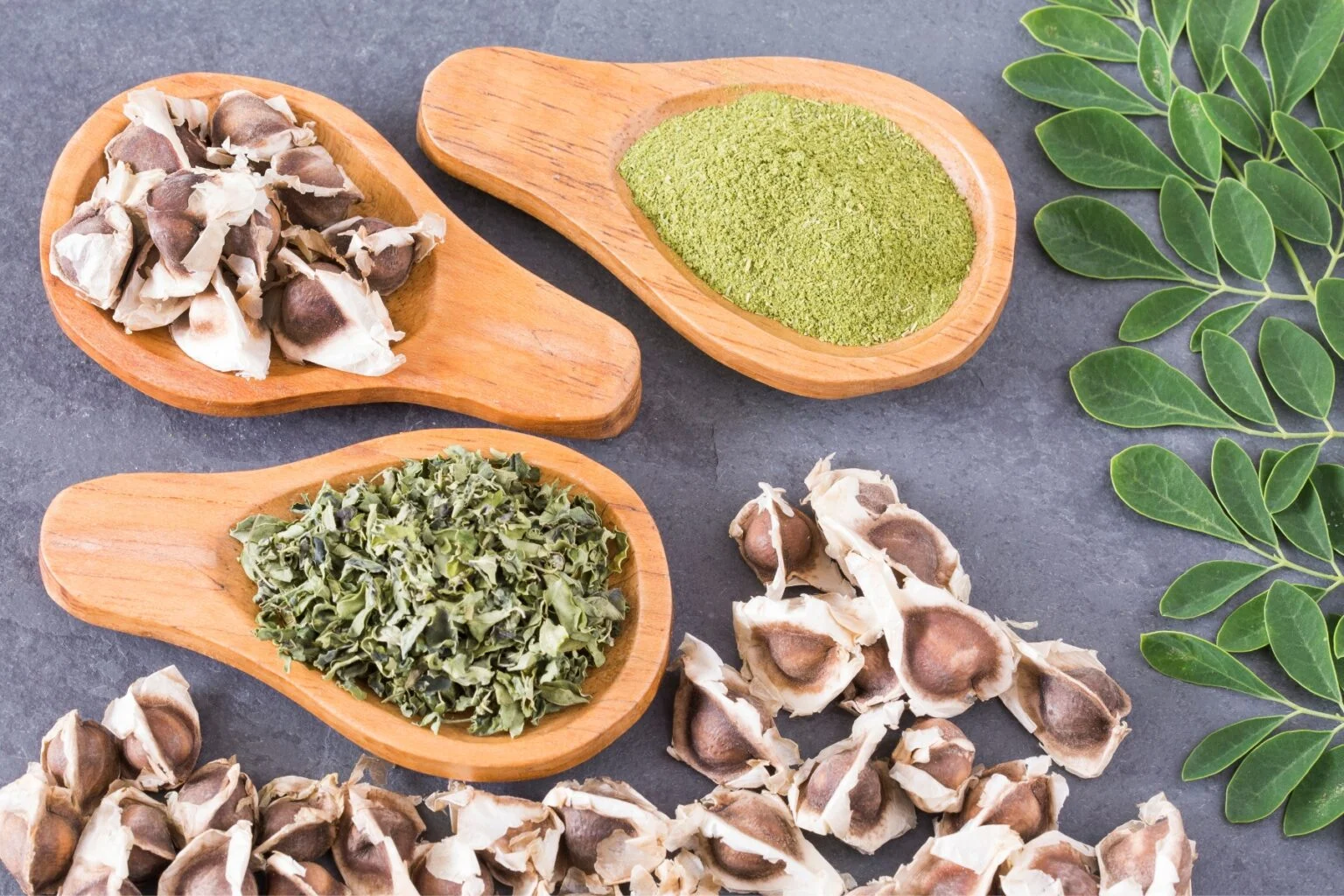Moringa, often referred to as the “miracle tree,” has garnered global attention for its impressive array of health benefits. Native to parts of Africa and Asia, particularly the foothills of the Himalayas, the tree Moringa oleifera is utilized in various cultures for its nutritional, medicinal, and economic value. Two of the most commonly used parts of the moringa tree are its seeds and leaves. Both parts offer unique benefits and uses, but they also have distinct differences. This article will delve into a comprehensive comparison of moringa seeds and leaves, exploring their nutritional profiles, health benefits, traditional uses, and potential side effects.
Nutritional Profile
Moringa Leaves: Moringa leaves are often hailed as a superfood due to their dense nutritional profile. They are rich in essential vitamins and minerals, making them an excellent addition to a balanced diet.
- Vitamins: Moringa leaves are particularly high in vitamins A, C, and E. Vitamin A is crucial for vision, immunity, and cell growth. Vitamin C is a potent antioxidant that supports the immune system, skin health, and wound healing. Vitamin E also acts as an antioxidant, protecting cells from damage.
- Minerals: They contain significant amounts of calcium, potassium, and iron. Calcium is essential for bone health, potassium helps regulate fluid balance and muscle contractions, and iron is vital for blood production and energy levels.
- Proteins and Amino Acids: Moringa leaves provide a good source of plant-based protein, containing all nine essential amino acids, which are crucial for protein synthesis and overall health.
- Antioxidants: These leaves are packed with antioxidants like flavonoids, polyphenols, and ascorbic acid, which help combat oxidative stress and reduce inflammation.
Moringa Seeds: Moringa seeds also offer nutritional benefits, although their profile differs from that of the leaves.
- Vitamins and Minerals: Moringa seeds are rich in vitamins like vitamin C and B-complex vitamins, including B1 (thiamine), B2 (riboflavin), and B3 (niacin). They also contain minerals such as magnesium, zinc, and calcium.
- Proteins: Similar to the leaves, the seeds are a good source of protein, though they contain less protein overall than the leaves.
- Fats: One significant difference is that moringa seeds have a higher fat content, providing healthy fats such as omega-3 and omega-6 fatty acids. These fats are essential for brain health, inflammation control, and overall cellular function.
- Antioxidants: Moringa seeds contain potent antioxidants like flavonoids and phenolic acids, which help protect against oxidative damage.
Health Benefits
Moringa Leaves:
- Nutrient Boost: The high vitamin and mineral content of moringa leaves makes them an excellent dietary supplement, particularly in regions where malnutrition is prevalent.
- Anti-Inflammatory Properties: The leaves contain compounds that can reduce inflammation, which is beneficial for conditions like arthritis and other inflammatory diseases.
- Antioxidant Effects: With a high antioxidant content, moringa leaves help fight oxidative stress, which can reduce the risk of chronic diseases such as heart disease and cancer.
- Blood Sugar Regulation: Studies have shown that moringa leaves can help lower blood sugar levels, making them beneficial for people with diabetes.
- Cholesterol Management: Regular consumption of moringa leaves may help lower cholesterol levels, supporting cardiovascular health.
- Detoxification: The leaves aid in detoxifying the body by removing toxins and heavy metals.
Moringa Seeds:
- Antimicrobial Properties: Moringa seeds have been found to possess antibacterial and antifungal properties, making them useful for treating infections.
- Anti-Inflammatory Benefits: Like the leaves, the seeds can reduce inflammation, which is helpful in managing various inflammatory conditions.
- Antioxidant Capacity: The antioxidants in the seeds help protect the body against oxidative stress and may reduce the risk of chronic diseases.
- Cardiovascular Health: The healthy fats in moringa seeds can help improve heart health by reducing bad cholesterol (LDL) and increasing good cholesterol (HDL).
- Water Purification: Moringa seeds have been traditionally used to purify water, as they contain compounds that can bind with impurities and toxins, making the water safer to drink.

Traditional Uses
Moringa Leaves:
- Culinary Uses: Moringa leaves are commonly used in cooking, added to soups, salads, and stir-fries. They can be dried and ground into a powder, which is used as a nutritional supplement.
- Medicinal Uses: Traditionally, moringa leaves are used in herbal medicine to treat various ailments, including digestive issues, respiratory problems, and infections.
- Nutritional Supplement: Due to their rich nutrient profile, moringa leaves are often dried and powdered to be used as a supplement in smoothies, teas, and other beverages.
Moringa Seeds:
- Culinary Uses: The seeds can be eaten raw or roasted. They are often used to extract oil, which is utilized in cooking and as a salad dressing.
- Medicinal Uses: In traditional medicine, moringa seeds are used to treat conditions like arthritis, hypertension, and digestive disorders.
- Water Purification: One of the most notable uses of moringa seeds is their application in water purification. The seeds can coagulate and remove impurities from water, making it safer for consumption.
- Skincare: The oil extracted from moringa seeds is used in skincare products due to its moisturizing and anti-aging properties.
Potential Side Effects
Moringa Leaves: Generally considered safe when consumed in moderate amounts, moringa leaves can cause some side effects if taken in excess or if an individual has specific health conditions.
- Digestive Issues: Overconsumption of moringa leaves may lead to digestive issues such as diarrhea, gas, or stomach cramps.
- Pregnancy Concerns: Pregnant women are advised to avoid moringa leaves in large amounts, as they may possess uterine stimulant properties that could potentially lead to complications.
- Drug Interactions: Moringa leaves may interact with certain medications, particularly those for diabetes and high blood pressure, potentially enhancing their effects and leading to low blood sugar or blood pressure levels.
Moringa Seeds: While moringa seeds offer many health benefits, they should be consumed with caution.
- Alkaloids: The seeds contain alkaloids that may lower blood pressure. While this can be beneficial for those with hypertension, it might cause hypotension (low blood pressure) in others.
- Digestive Issues: Like the leaves, consuming too many moringa seeds can cause digestive disturbances, including nausea and diarrhea.
- Toxicity Risk: Consuming moringa seeds in very large quantities might pose a risk of toxicity, so it is important to adhere to recommended dosages.
- Pregnancy and Breastfeeding: Pregnant and breastfeeding women should avoid moringa seeds due to the lack of sufficient research on their safety during these periods.
Conclusion
Moringa seeds and leaves each offer a wealth of nutritional and medicinal benefits, though they differ in their specific properties and applications. Moringa leaves are incredibly nutrient-dense, providing a rich source of vitamins, minerals, proteins, and antioxidants. They are particularly beneficial for boosting overall nutrition, reducing inflammation, and combating oxidative stress. On the other hand, moringa seeds are valued for their antimicrobial properties, healthy fats, and unique applications such as water purification.
When incorporating moringa into your diet or wellness routine, it is important to consider these differences to utilize each part of the plant effectively. While both parts are generally safe, they should be consumed in moderation, and it is always advisable to consult with a healthcare provider, especially for individuals with underlying health conditions or those who are pregnant or breastfeeding.
In conclusion, whether you choose moringa seeds or leaves, you are likely to benefit from the remarkable properties of this “miracle tree.” By understanding the unique benefits and potential side effects of each part, you can make informed decisions to enhance your health and well-being.
Ajigofarms is a reliable global agricultural purchase sourcing with profound expertise in the manufacturing, and exportation of food crops. We are tested, and trusted suppliers of all kinds of cash crops and food crops. Our constant supply chain solution makes exporting easy, quick, and safe, we are identified with timeliness and meeting up with deadlines. Regardless of the region you are located in worldwide, you can reliably order your Agric products and be rest assured of successful delivery.




